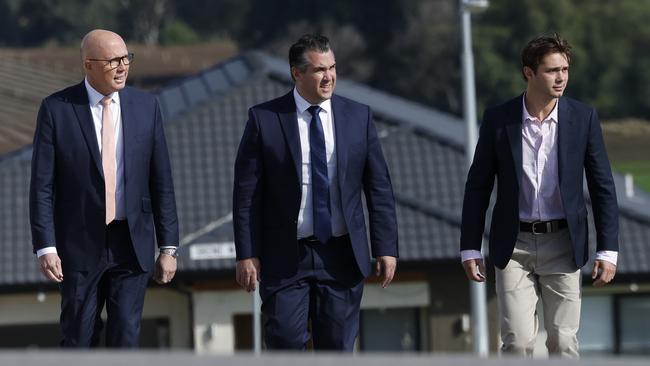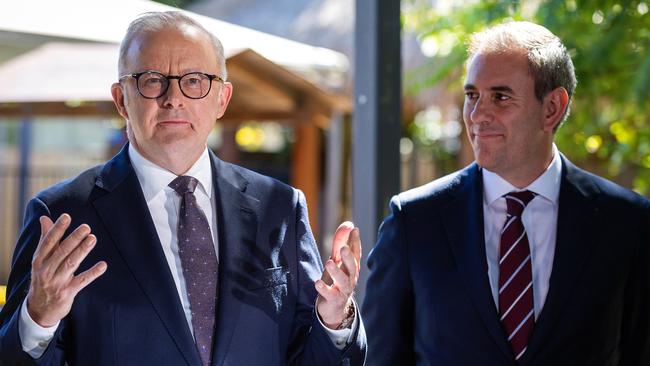Matt Cunningham reflects on 2025 Federal Election promises
The major parties have traded discipline and principles for financial bribes and pork barrelling they presumably think can be funded by an evergreen money tree, writes Matt Cunningham.

News
Don't miss out on the headlines from News. Followed categories will be added to My News.
Every now and then in this strange jurisdiction there are calls for Canberra to step in and take the place back.
There’s often good evidence to support this argument.
Just this week you can see a couple of examples of why perhaps the Northern Territory is not particularly competent, particularly in the area of financial management.
We’ve just opened a bridge on Tiger Brennan Drive to avoid a single set of traffic lights at a cost of $170m, about $100m more than the original budget.
And there are plenty of questions being asked about the Darwin Waterfront Corporation, which costs Territory taxpayers (actually, WA taxpayers) more than $20m a year.
But the events of this week have proved that if we’re after fiscal responsibility, we’re unlikely to find it in the nation’s capital.
There, the major parties have traded discipline and principles for financial bribes and pork barrelling they presumably think can be funded by an evergreen money tree.
At the beginning of the third week of an underwhelming election campaign, Labor and the Coalition revealed their housing policies.

The ALP is promising to help anyone buy a first home with a deposit of just five per cent. The government would then effectively be the guarantor and allow the first-home buyers to avoid lenders’ mortgage insurance.
The Coalition will allow first-home buyers to access up to $50,000 from their superannuation and will make interest payments on the first $650,000 of a newly built home tax deductible for five years.
In each case, the cost will be extraordinary, and the impact questionable.
Economists were united in their criticism.
Chris Richardson from Rich Insight said the policies would only benefit already wealthy homeowners, not people trying to crack the market.
“Both sides of politics have been doing dumb things around pumping up housing demand for 60 years now; this is as bad as I have seen,” he said.
That might not create as big a problem in Darwin as in other parts of the country, as house prices here are still below 2014 levels, but it will also almost surely drive up the rental prices, which are the second highest of any capital city in the country.
The policies also illustrate a growing shift of the major parties away from the principles on which their entire movements were based.
During the ABC’s election debate on Wednesday night, host David Speers asked Prime Minister Anthony Albanese why his party’s housing policy, like Labor’s energy rebate, wasn’t means tested.
He avoided the question, possibly because he knows it’s a betrayal of the values his party once held dear.

The Coalition’s superannuation policy is also a betrayal of principle by a party that once placed a firm value on fiscal responsibility.
Reducing the amount of superannuation people have in retirement will only put a greater burden on the taxpayer down the track.
In 2005, similar proposals from the New South Wales Labor Government and the Family First party (remember them) were rejected out-of-hand by Liberal Treasurer Peter Costello.
“The Government has looked at this on a number of occasions … for the reasons we gave Family First, namely that the policy would redirect money from a person’s retirement income into a housing market that is already very strong, the Government did not adopt the policy,” he said.
The Coalition argues times have changed and we now face a housing “crisis”, but that is a word much overused in a time when few would know what a real crisis looks like.
Burnt by electoral backlash, the appetite for genuine structural reform – think John Howard’s Work Choices or Bill Shorten’s reform of negative gearing and franking credits – are gone, replaced by a bidding war for the votes of younger Australians who no longer have a strong affinity with either party.
But at the end of the day, someone will have to pay.
For one thing that is certain about both parties’ housing policies is that they will have a significant impact on the budget’s bottom line.
And as the Territory well knows, crippling levels of debt make it very hard to run a government.
More Coverage
Originally published as Matt Cunningham reflects on 2025 Federal Election promises




